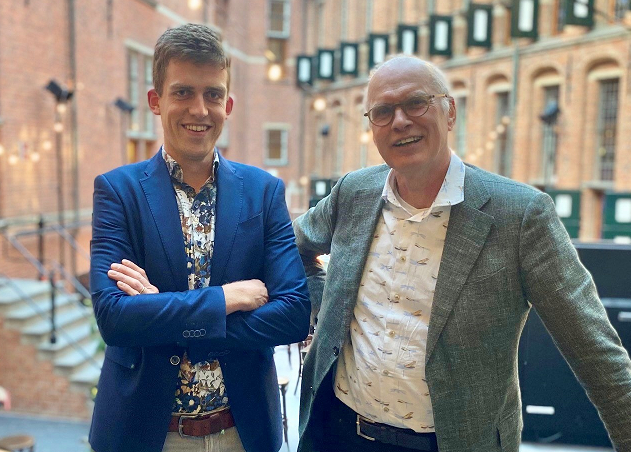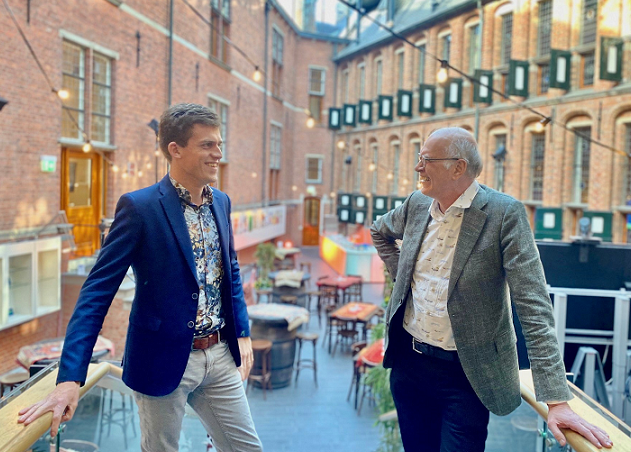
Pictured: Thijs Zondag (left) and Tjeerd Postma (right). © Wunderline
Tjeerd, how do you look back on the past years as project leader?
Tjeerd: Tjeerd, how do you look back on the past years as project leader?
Tjeerd: "First and foremost, the past 7 years that I have worked for the Wunderline project have been incredibly fun. Both with the Wunderline team from the province of Groningen and the German partners. An international project like this is never really finished, nor is there a blueprint. It is constantly looking for solutions. Personally, I find that very inspiring and challenging."
What did you learn the most from?
Tjeerd: "Deploying strategic environment management in cooperation with German partners. For example, with municipalities along the line, with the Chain Mobility network. That was really something new for me, but as far as I am concerned it is one of the success pillars of this project. I have also noticed that the importance of a European grant puts enormous positive pressure on the project. You have to come up with results to get follow-up funding and that makes people act faster. Without the EU grant, we would probably never have been able to sign an agreement so quickly."
Thijs, what do you want to focus on in the near future?
Thijs: "First of all, getting construction step 1 executed as well as possible within budget, schedule and scope. And also, together with Niedersachsen, Bremen and all other stakeholders, to get a clear and realistic perspective for the continuation of the project after 2024 (construction step 2). Whether this will be with a direct train or some other form, we will of course have to work that out together. In any case, these are two important tasks for the coming period."
Construction step 1 is scheduled to be completed by the end of 2024, and trains will once again cross the Friesenbrücke. What are the plans after that?
Tjeerd: "Building step 1 has gone up significantly in cost, especially in Germany. And building step 2 is also a huge cost. The current financing strategy is no longer sustainable. Together with the German partners, we need to look at a step-by-step approach for building step 2."
Thijs: "Yes, there is a common task to re-frame building step 2. We find that in the current research on a direct train, there is sometimes confusion that this is a train that races past the entire region. This image is incorrect. It is a train is that you no longer need to change trains between Groningen and Bremen. It is important to get this image clear, so that everyone involved in the project has the same starting position."
Tjeerd mentioned earlier that cooperation with German partners is very good. What is the success factor?
Tjeerd: common with a colleague from Lower Saxony. These personal conversations arise outside the project and definitely contribute to a pleasant cooperation."
Thijs: "I completely agree with that. By the way, what is also appreciated is that we Dutch speak German during the meetings. You prefer to take important decisions in your mother tongue. Speaking German so intensively when I just joined the project was quite a challenge, I thought, but it's going really well."

What does the Wunderline mean for the communities along the railway line?
Thijs: "The Wunderline is not just one train. The Wunderline is a cross-border mobility concept that includes several train services. But just as important is that residents from the communities should be able to travel easily to and from the stations. We therefore also improve station connections and accessibility. We also work together with the municipalities involved to make the stations more pleasant, so that waiting becomes more comfortable and you can get a coffee or snack in between, for example. Municipalities along the line will benefit because their residents will soon be able to travel faster, more comfortably and more easily between Groningen and Bremen."
What is the importance for the province of Groningen?
Tjeerd: "Strengthening the economic structure of the entire northern border region. Offering residents an alternative to car use, which is even more important now with current climate developments and high energy prices."
Thijs: "You also offer residents of the province interesting connections in Germany to an international rail network. From other (big) cities in Germany such as Berlin to Scandinavia. This makes studying and working across the border more attractive and is an important stimulus for tourism, art and culture."
What do you expect from a new deputy to succeed Fleur Gräper-van Koolwijk in the middle of this year?
Tjeerd: "I really hope we get administrators with as much commitment as Fleur Gräper and Berend Lindner, the previous State Secretary of Lower Saxony. Directors who also say that we have to continue and support our project wholeheartedly. I would like to see the Wunderline in the province included in the college agreement again. Especially with the arrival of a Lelyline ambition, you have to ensure that the Wunderline is taken a step further. I dare say: without Wunderline, no international Lelyline!"
Thijs: "I also hope that the new college will again give its full consent to the further development of the Wunderline. In any case, the new deputy will experience a nice milestone soon when construction step 1 is completed and the Friesenbrücke reopens."
Finally, Tjeerd, what would you like to pass on to your successor?
Tjeerd: "I was hoping you would ask this question! I always say this: even though we are techies, 80% of our work is psychology and 20% is content. The content of the work has to be right, of course, but make sure it's fun and don't make it too difficult. Even if there are sometimes setbacks. If you enjoy your work that also translates to creative solutions and the rest of the team."
Thijs: "Thanks to Tjeerd's work over the past few years, the project is already running very well. To take over the baton like this feels like a warm bath. The train moves on, even after 2024 and then over the new Friesenbrücke from Groningen to Bremen!"